One Year Later, a Small Texas Town Reflects on the Pandemic
By Benton Graham
Reporting Texas
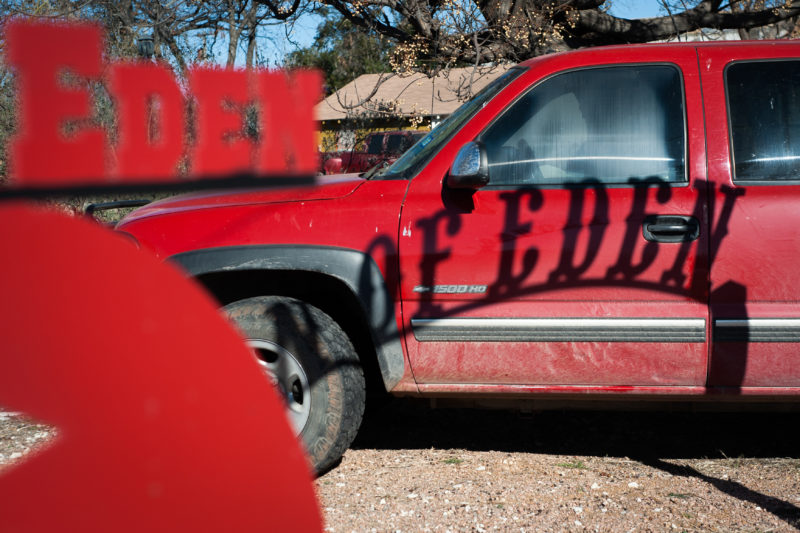
The small town of Eden in Concho County, is roughly half way between Austin and Midland. Andrés Garcia/Reporting Texas
In the spring of 2020, Reporting Texas set out to cover the plight of small towns in a changing Texas by reporting on the town of Eden in Concho County. Then COVID-19 struck. We pivoted to looking at how Eden was dealing with the pandemic.
In March 2020, the state of Texas limited social gatherings to fewer than 10 people, closed schools and prohibited in-person dining at restaurants and bars. When the state eventually rolled back these restrictions, the community began to adapt to a new reality.
Concho County registered its first COVID-19 case in April. Nearly a year later, the county, population 3,266, had confirmed 321 cases and seven deaths. Almost 10% of county residents have contracted the virus. In Travis County, where Austin is located, about 6% of residents have contracted COVID-19.
How have Eden residents’ lives changed during the pandemic? How have businesses survived? How have schools managed to function? Reporting Texas checked back in with Edenites to answer these questions.
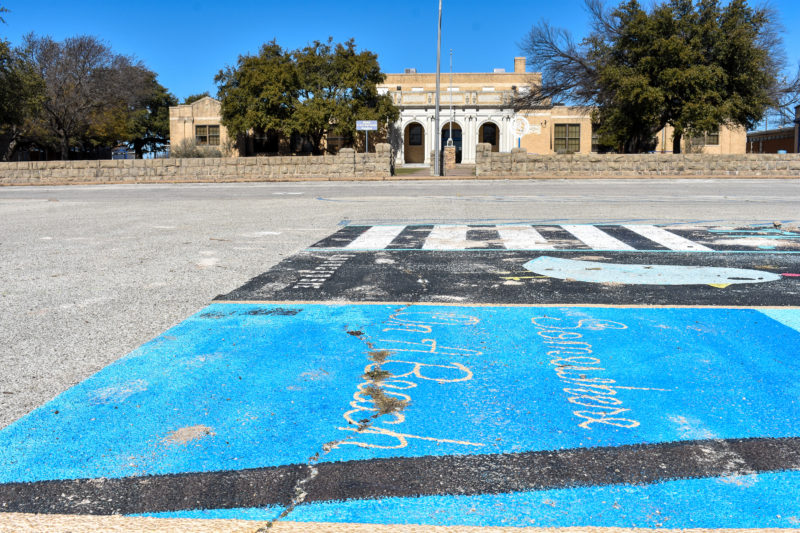
An empty parking lot is pictured outside of Eden High School on Feb. 6, 2021. James Boswell/Reporting Texas
Matt Odom, principal, Eden High School
As Eden High School prepared to re-open its doors to all students in early November, Principal Matt Odom saw a notification pop up on his phone. Several members of the school’s staff had tested positive for COVID-19.
Eden High School had started the 2020-21 school year with a hybrid teaching structure. Students had the option to attend classes in person or virtually. Students taking classes virtually struggled to keep up, Odom said.
“I had become concerned about students’ mental health. They need a purpose every day,” Odom said.
The school went fully virtual for two weeks in November after an COVID-19 outbreak among staff.
“It was very frustrating because everyone was hopeful to resume normalcy. It was a big letdown,” Odom added.
Students came back to campus for the three weeks leading up to winter break, and the school has operated fully in-person since. It’s been challenging, Odom said. Two students tested positive for COVID-19 in early January, but the school remained open.
Odom has prioritized normalcy and wants the services the school provides to remain available to students. For example, around 70% of students receive free or reduced cost lunches at school. The school also offers high-speed internet, something most students can’t access at home.
Eden High School has continued to compete in sports and plans to host a prom on Valentine’s Day. Students will be required to wear masks during the dance.
As vaccine distribution ramps up, Odom is looking forward to things returning to their pre-pandemic normal. That said, he doesn’t have much time to think about the future these days.
“We could be back online tomorrow, and no one needs that,” he said. “It’s much better the way it is now.”
Hazel Medders, director, Eden Community Food Pantry
Canned vegetables, fresh meat, bread, noodles, peanut butter and more fill the shelves of the Eden Community Food Pantry. Despite steady demand, the pantry has managed to stay stocked during the pandemic.
“We have been very blessed. People have been very generous,” said Hazel Medders, the pantry’s director.
The pantry served around 50 families per weekend, an increase from the typical 35 families, in the weeks immediately following lockdown restrictions implemented by Gov. Greg Abott, Meders said. Those restrictions required non-essential businesses to close and required restaurants and bars to only provide to-go service.
In the months that followed, she stocked the pantry with extra food to ensure that it could accommodate another surge. Demand has largely returned to its pre-pandemic level, Medders said.
Medders receives two or three emergency calls per month from families needing to quarantine due to illness, she said. When families are forced to quarantine, they often can’t earn money and turn to the pantry for support, she added.
Medders is launching a campaign aimed at increasing donations from local businesses. Many of the people who patronize the pantry previously spent money at local businesses. Those businesses have a responsibility to pay it back to people in need, she said.
Some businesses can’t afford to make a donation right now, Medders said. Nonetheless, she is confident she can trust the community for support in a time of need. Many employees of a local wind farm — Renewable Energy Systems’ Maverick Creek project — have donated, for example.
“If I ever need something, all I have to do is ask,” Medders said.
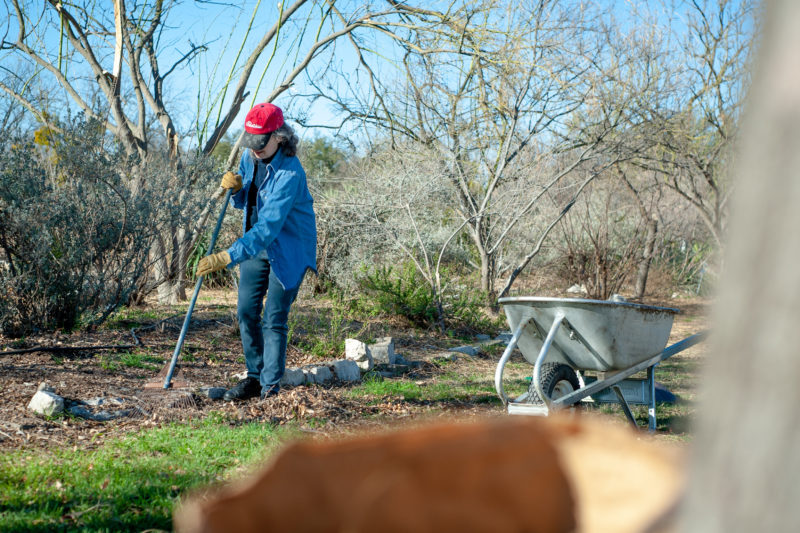
Volunteer Pam Young works at the Garden of Eden on Feb. 6, 2021, in Eden, Texas. Andrés Garcia/Reporting Texas
Craig Pfluger, economic development coordinator, City of Eden
While many businesses have struggled through the pandemic, Craig Pfluger, the town’s economic development coordinator, is optimistic. As the virus tore through cities last spring, many city dwellers began to look for places to live with more space.
Eden offers exactly that, Pfluger said.
“There’s going to be long-lasting changes from this coronavirus, and that’s one of them,” he said.
Eden now finds itself in competition with other small towns in Texas, as they try to woo people fleeing cities, Pfluger said. Specifically, the town is accelerating its implementation of high speed internet, an amenity only currently available at the Eden High School campus.
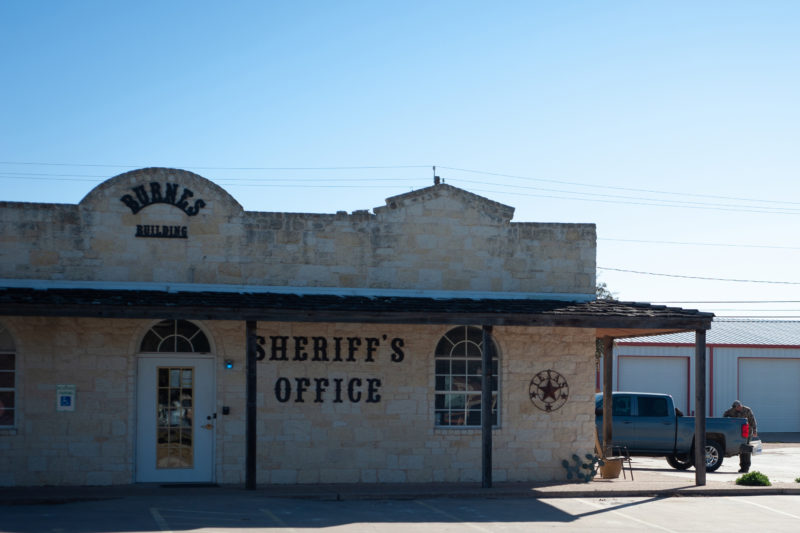
The Concho County Sheriff’s Office is pictured off of Broadway Street on Feb. 6, 2021 in Eden. Eden’s downtown square is located at the intersection of U.S. Highway 87 and U.S. Highway 83 — locally referred to as Broadway and Main streets respectively. Andrés Garcia/Reporting Texas
Pfluger has had exploratory talks with home builders in nearby San Angelo to build more high-quality starter homes in Eden. However, those talks have stalled, as investors have been reticent to spend money during a time of economic uncertainty, Pfluger said.
Pfluger has spoken with a few people from the Austin area who have expressed interest in moving to a rural town like Eden. However, the primary migration to Eden at this point has been retirees leaving more expensive states, such as California, he added.
“Why would someone move to Eden?” he said. “It’s a quality of life and affordability issue.”
The town has also sought to keep its arts and music scene alive through concerts at the Green Apple Arts Center — although about 60 percent of shows planned for 2020 had to be rescheduled. The venue, an indoor space that holds 175 people, has had to adapt to allow social distancing by moving shows to the back yard with seats properly spaced out, Pfluger said.
“We’re not comfortable crowding 175 people in there,” he said. “If we put 175 people in there, they’d be sitting side-by-side.”
The venue plans to hold its first concert of the year in March, without its typical buffet-style meal option, he added.
In the coming months, as the state’s vaccination efforts help Eden emerge from the pandemic, but the town won’t go back to normal overnight, Pfluger said.
“I think there’s going to be a hesitation. I don’t think that all of a sudden you’re just going to want to go to bars and restaurants that are packed,” he said
Steve Belote, pastor, formerly of Hallelujah Trail Cowboy Church
The pandemic didn’t stop Hallelujah Trail Cowboy Church, which held outdoor services for around 40 people through most of last spring and summer.
Steve Belote, 60, said that he understood the health concerns of congregants who are worried about getting sick with COVID-19 and has streamed services on Facebook Live. At the same time, he sees faith as a vital component to overcoming challenging circumstances.
“We are supposed to be joyful. We are supposed to be happy. And if you let something like this get to you, you can’t be happy,” Belote said.
In early September, Belote and his wife moved to Amarillo to lead The Chutes Cowboy Church and be closer to his family. He had led the congregation at Hallelujah Trail for 10 years and had come to view Eden as home.
“It was very, very emotional,” Belote said of his last service at Hallelujah Trail. “We had spent 10 years of our life there and made a lot of friends and family.”
Since he left, Hallelujah Trail has been led by members of the congregation and is still searching for a new pastor.
In November, Belote thought he had the flu. When he learned that it was COVID-19, he recovered in his home and stayed away from other people.
Since starting the Chutes Cowboy Church in Amarillo in September, his congregation has grown from 10 people to around 40 people. The church cleans all surfaces thoroughly, holds services outside when the weather permits and encourages congregants to stay home if they don’t feel well, Belote said. He also streams services on Facebook Live.
However, Belote said that he doesn’t require masks because he believes people should be able to make decisions for themselves. He added that he doesn’t force people to go to church but encourages congregants to not let the virus intrude on their lives.
“We can’t be scared of this disease,” Belote said. “We all have a choice.”
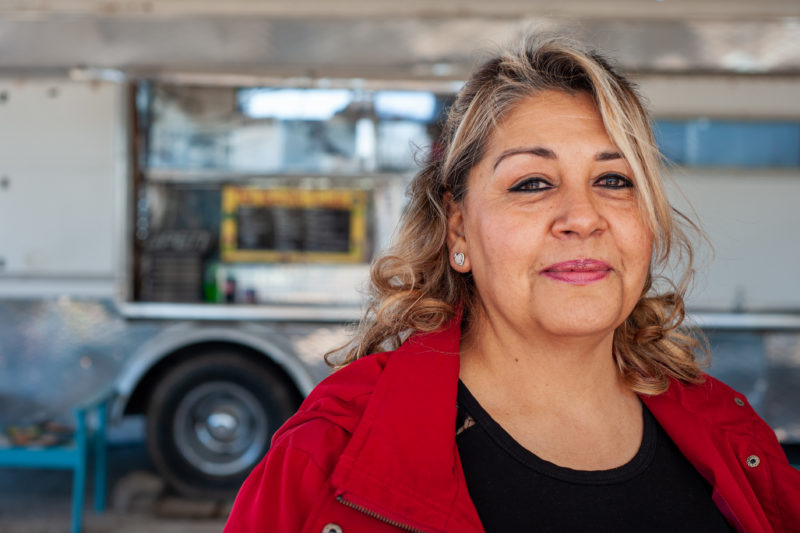
Cynthia Gonzalez is a twenty-year resident of Eden and co-owner of The Burrito Lady — a Tex-Mex food truck located on the southern edge of Eden’s downtown square. Gonzalez, pictured on Feb. 6, 2021, runs the food truck with her husband Roger. Andrés Garcia/Reporting Texas
Cynthia Gonzalez, co-owner, The Burrito Lady
As people avoid indoor dining during the pandemic, many have turned to food trucks as a safer alternative. That’s been good for Cynthia Gonzalez, who operates a food truck called The Burrito Lady.
“People didn’t want to go to restaurants, and we have been super busy,” Gonzalez said.
Like so many others, Gonzalez initially struggled to find the basics at grocery stores, including paper towels and some burrito ingredients. Now she has completely stocked up to make sure the truck has emergency provisions.
She’s also redesigned the small seating area by spacing tables further apart to ensure that customers who want to dine on-site can do so safely.
The most steady customers are hunters and employees from the local Renewable Energy Systems wind farm, Gonzalez said. In fact, business is so strong that she plans to diversify by packaging and selling her popular hot sauces.
Her business is doing so well that the initial shock of the lockdown feels like a distant memory, Gonzalez said.
“It was a stressful and trying time, but now not so much,” she said.

Roger Gonzalez, co-owner of The Burrito Lady food truck, searches for a utensil on Feb. 6, 2021, in Eden. James Boswell/Reporting Texas